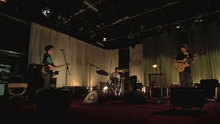Damon Albarn is right about one thing – it was one hell of an oversight for Sir Bob to miss out the entire UK hip hop scene at Live8, arguably the most vibrant musical movement in this country of the last fifteen years. With Dizzee et al conspicuous by their absence, it was down to a relative unknown to briefly represent Grime: you might have spotted a young rapper supporting Ms Dynamite as she performed her new single.
That rapper was Akala of North London, and let’s make no mistake, he was there because he’s Ms Dynamite’s brother. But don’t dare suggest that his career is simply a case study in nepotism: “I totally understand that my sister is a really big artist and a very respected artist,” admits Akala. “But I did my own thing completely. People respect me for it. But some people will always find something and turn it into a negative.”
Akala is an example of how UK hip hop has eclipsed indie in terms of self-sufficiency. He’s released self-produced mixtapes, singles and videos on his own label for two years, and reached number 10 in the national Indie Chart with ‘Roll Wid Us’. The video for ‘War’ made history as the first by an unsigned artist to feature on MTV’s flagship show, TRL. All of this has led to support tours with 50 Cent, Saul Williams and Mercury-nominated M.I.A. He’s established an astute lyrical style which he’s taken to the next level with new single, ‘Bullshit’.
In person, Akala is a man whose impressive lyrical flow is matched by his conversational jags. He bridges naturally from one subject into another, making an interviewer’s job easy. Despite having a lot to be proud of, he’s distinctly level-headed when it comes to braggadocio. And for a 21-year old he has an impressive understanding of the failings of the music business.
“The thing is, most labels don’t understand what they would call ‘black music’,” he says. “The thing they don’t understand is that music is music. Bob Marley just made great music. They think it’s some mysterious thing, and that they have to be over the top and street and cool.”
It was this lack of faith in the powers that be that led Akala, Ms Dynamite and producer Rez to start the Illa State record label, through which he releases his own music. But his single mindedness didn’t start there: at 18, he opened his own West Indian Restaurant in Ayia Napa.
“Myself and my close friend Justin were sat down one day and… I’m always looking for gaps in the market for things, and one day I said to Justin ‘you know how Ayia Napa is where the garage crowd go on holiday, but there’s no West Indian restaurants there. There’s Pizza Hut and McDonalds. That’s the one complaint we always hear – there’s no yard food. Don’t you think it would be a good idea to open a restaurant?’ And Justin just said ‘do it – don’t talk about it, just do it.’”
So he did. He’s also made a relative success of the football game, playing on the schoolboy team for West Ham then going on to a YTS scheme for Wimbledon. “Football was what I was going to do. I played at a good standard, but then I got into music. And the thing is, football is an art form and if your heart’s not in it, it will show.”
Akala has been writing lyrics since the age of nine or ten and first went into a studio at fourteen. As a lyricist his early influences were eclectic –he namedrops Jay-Z and Shakespeare: “I didn’t fully understand it, but I was interested in the linguistics he used. I studied things like ‘Romeo and Juliet’ and one or two others like ‘King Lear’ in school. I was really drawn to that, it was so different from any other literature that I’d read. He was a lyricist. He used descriptive phrases as a metaphor for something.”
DiS: What kind of lyrics were you writing when you were ten? “It wasn’t dissimilar to what I’m writing now. I’m very opinionated in terms of what’s going on in the world and issues in communities. And that’s the kind of stuff I was rapping about at the age of ten. I didn’t rap about going to the sweet shop. I’m always interested in writing about what’s going on, but it has to be entertaining – it’s the entertainment business.”
Akala’s new single fulfils his infotainment objective pretty neatly. Out on October 10, ‘Bullshit’ is both a bouncy old skool call-and-response track and a diatribe against everything wrong in the world right now, from the War in Iraq to “manipulation of the news” and “the English tax system”.
“I asked loads of people, like I asked my mum what things she thinks are bullshit. And I took all the things that people thought were bullshit and made them into a song. It’s got everyday stuff like traffic wardens as well as serious issues like the war. It has to be entertaining or there’s no point. No one wants to be depressed. Everyone relates to the song. They agree with all the lines. No one respects Bush or the war.”
Shrewdly, Akala is marketing himself outside the hip hop ghetto by playing rock festivals like Reading and Glastonbury with a live band. His album also features plenty of rock influences, even acoustic guitars. When I speak to him he’s excited about the fact that he’s just got authorisation to use a sample from The Clash’s ‘London Calling’ on a forthcoming track.
“It could be a rock album, but I’m rapping. Hip hop has been stagnant for years. It’s a shame, ‘cause hip hop was great in the ‘80s. It upsets me. We’re trying to stay away from the whole stereotype of guns and bitches and everything. The thing about rappers like that is they’re telling lies. No matter what your background is, you don’t enjoy the streets, so to glorify that… there’s nothing nice or pretty about it.
“Take a band like the Red Hot Chili Peppers – for me, I feel their music is very hip hop influenced. It’s beautiful, even though I don’t understand what Anthony is talking about. It sounds like poetry – their songs have been a huge influence. And Keane’s another band. Very melancholy but I really like it. The British bands are leading the way, but I feel in urban music there’s so much talent and the situation with the US is ruining that side of things.”
During the interview, we discover that until recently Akala lived virtually opposite me, in North London’s Archway. I suggest that the mix of cultures in the area might have influenced his warm, eclectic style.
He agrees: “It’s a very strange place – so many different cultures. Many types of people. Camden is the biggest mixing pot. There’s drug addicts, grungey people… you see about 10 drug addicts when you leave the tube station… grunge kids… rastas. I feel that North London is the broadest in terms of musical taste.”
And if that’s the truth then Akala is definitely a product of his environment.
















